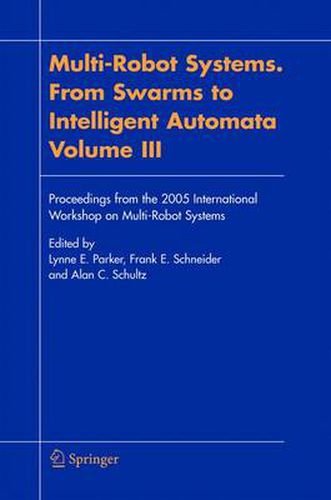Readings Newsletter
Become a Readings Member to make your shopping experience even easier.
Sign in or sign up for free!
You’re not far away from qualifying for FREE standard shipping within Australia
You’ve qualified for FREE standard shipping within Australia
The cart is loading…






This title is printed to order. This book may have been self-published. If so, we cannot guarantee the quality of the content. In the main most books will have gone through the editing process however some may not. We therefore suggest that you be aware of this before ordering this book. If in doubt check either the author or publisher’s details as we are unable to accept any returns unless they are faulty. Please contact us if you have any questions.
TheThird International Workshop on Multi-Robot Systems was held in March 2005 at the Naval Research Laboratory in Washington, D. C. , USA. Bringing together leading researchers and government sponsors for three days of technicalinterchange on multi-robot systems, theworkshop follows two previous highly successful gatherings in 2002 and 2003. Likethe previous two workshops, the meeting began with presentations byvarious government p- gram managers describing application areas and programs with an interest in multi-robot systems. U. S. Government representatives were on handfrom theOf?ce of Naval Research and several other governmental of?ces. Top - searchers inthe ?eld then presented their current activities in many areas of multi-robot systems. Presentations spannedawide rangeof topics, incl- ing task allocation, coordination in dynamicenvironments, information/sensor sharing andfusion, distributed mapping and coverage, motion planning and control, human-robot interaction, and applications of multi-robot systems. All presentations were given in a single-track workshop format. This proce- ings documents the work presented at the workshop. The research presen- tions were followed by panel discussions, in which all participants interacted to highlight the challenges of this ?eld and to develop possible solutions. In addition to the invited research talks, researchers and students were given an opportunity to present their work at poster sessions. We would like to thank the Naval Research Laboratory for sponsoring this workshop and providing the - cilitiesforthesemeetingstotakeplace. WeareextremelygratefultoMagdalena Bugajska, Paul Wiegand, and Mitchell A. Potter, for their vital help (and long hours) in editing these proceedings and to Michelle Caccivio for providing the administrative support to the workshop.
$9.00 standard shipping within Australia
FREE standard shipping within Australia for orders over $100.00
Express & International shipping calculated at checkout
This title is printed to order. This book may have been self-published. If so, we cannot guarantee the quality of the content. In the main most books will have gone through the editing process however some may not. We therefore suggest that you be aware of this before ordering this book. If in doubt check either the author or publisher’s details as we are unable to accept any returns unless they are faulty. Please contact us if you have any questions.
TheThird International Workshop on Multi-Robot Systems was held in March 2005 at the Naval Research Laboratory in Washington, D. C. , USA. Bringing together leading researchers and government sponsors for three days of technicalinterchange on multi-robot systems, theworkshop follows two previous highly successful gatherings in 2002 and 2003. Likethe previous two workshops, the meeting began with presentations byvarious government p- gram managers describing application areas and programs with an interest in multi-robot systems. U. S. Government representatives were on handfrom theOf?ce of Naval Research and several other governmental of?ces. Top - searchers inthe ?eld then presented their current activities in many areas of multi-robot systems. Presentations spannedawide rangeof topics, incl- ing task allocation, coordination in dynamicenvironments, information/sensor sharing andfusion, distributed mapping and coverage, motion planning and control, human-robot interaction, and applications of multi-robot systems. All presentations were given in a single-track workshop format. This proce- ings documents the work presented at the workshop. The research presen- tions were followed by panel discussions, in which all participants interacted to highlight the challenges of this ?eld and to develop possible solutions. In addition to the invited research talks, researchers and students were given an opportunity to present their work at poster sessions. We would like to thank the Naval Research Laboratory for sponsoring this workshop and providing the - cilitiesforthesemeetingstotakeplace. WeareextremelygratefultoMagdalena Bugajska, Paul Wiegand, and Mitchell A. Potter, for their vital help (and long hours) in editing these proceedings and to Michelle Caccivio for providing the administrative support to the workshop.